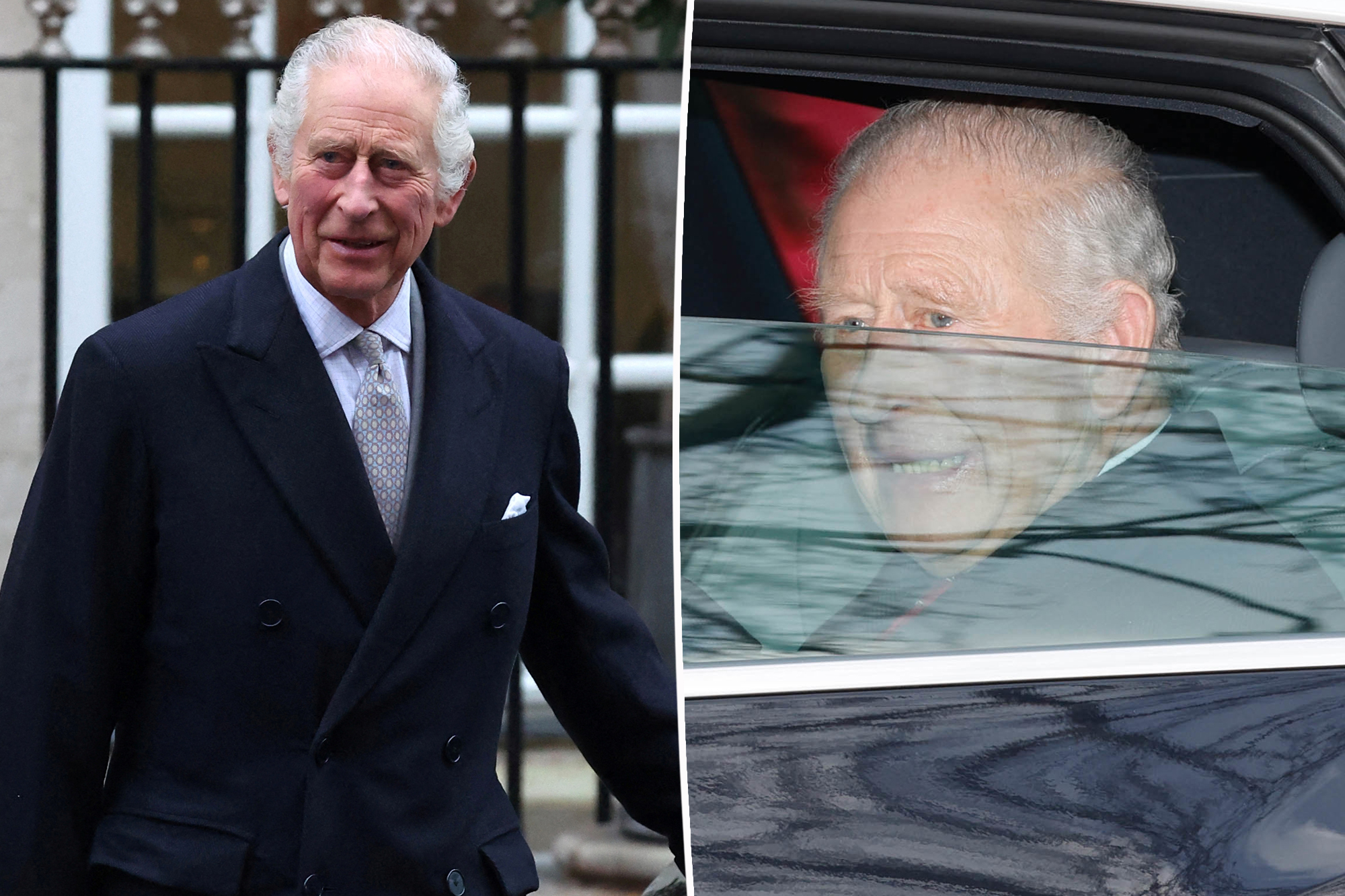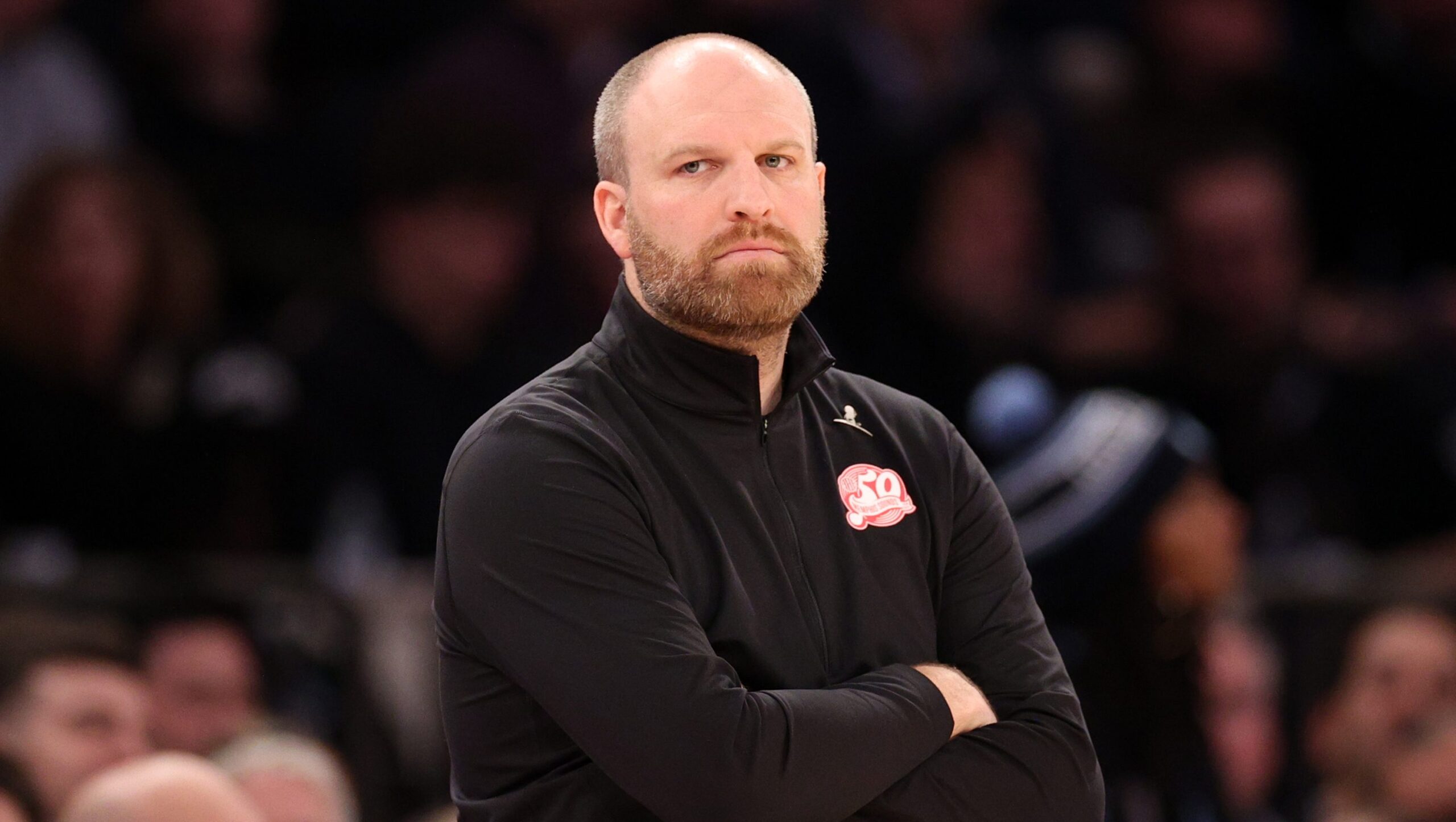Whereas filming the dystopian indie drama “The Evaluation,” stars Elizabeth Olsen and Alicia Vikander discovered nature to be a vital touchpoint for understanding its unusual, mesmerizing sci-fi world.
In theaters now, the debut characteristic by Fleur Fortuné is ready in a post-apocalyptic panorama during which {couples} need to endure a state-administered take a look at to see if they are often allowed to grow to be dad and mom. Mia (Olsen) and Aaryan (Himesh Patel) settle for an assessor named Virginia (Vikander) into their house to observe them for seven days. They quickly discover that the evaluation actually requires the couple to exhibit their parenting abilities, as Virginia acts like an precise little one that must be bathed and fed.
Because the evaluation unfolds, viewers additionally study in regards to the situations that led to this society during which the federal government controls copy. Mia and Aaryan’s life is a mixture of ultramodern and acquainted parts — their home is positioned by the ocean and geared up with sensible voice instructions and an “workplace” the place Aaryan generates digital animals. Mia tends to a close-by greenhouse of vegetation and swims within the water. Their society is partitioned off from the “previous world,” an space of Earth destroyed by a local weather disaster that just about worn out humanity years earlier than.
That catastrophe hangs within the background and permits the movie to pose delicate questions on parenting, ethics and local weather points. Olsen and Vikander spoke with Selection through Zoom about filming in Spain’s Canary Islands on Tenerife, how the pure atmosphere formed the manufacturing and determining the characters’ physicality.
What was it like working with Fleur?
VIKANDER: I feel we had a extremely fantastic time. It’s very nice to catch up now and see one another once more. We’ve been speaking quite a bit about, each of us, that we have been actually impressed after we each got here throughout her work and noticed the music movies and nearly to the purpose of quick movies that she had made earlier than. She’s a director with a really robust sense of her visible language, which is basically spectacular. And I feel, realizing that, after seeing her work, that she was going to tackle this story, combined with the form of themes and parts of this very form of intimate chamber piece, we have been very excited to work together with her. And sure, it’s her first characteristic movie. However she is aware of precisely what movie she needed to make, proper from the get-go, and I felt like she had a method of speaking her imaginative and prescient and her concepts in a really spectacular method from the beginning.
OLSEN: Yeah, she actually is such a singular individual. And simply to cite her husband, he at all times says that there’s a “Fleur filter.” So that you would possibly learn a guide and consider one thing that’s within the guide, however the way in which Fleur processes it’s simply in its personal filter.
I do know Fleur has mentioned that her curiosity within the movie has stemmed from her expertise with IVF, and she or he’s in contrast it to the present state of reproductive rights. Have been you additionally fascinated by the movie’s premise by means of these angles?
OLSEN: The best way, as an actor, we connect with completely different tales are at all times very private, and I feel the factor that I discovered so releasing inside this movie is it doesn’t inform you a thesis assertion of what to assume, consider or really feel. It permits house so that you can mirror by yourself innate rights. It permits you to mirror on the assets we use on this planet, permits you to mirror on why do I wish to grow to be a mother or father? Who will get these assets? Why do you deserve to make use of assets? And so I feel there’s so many issues which can be elegantly provided for an viewers to stroll away fascinated by with out providing you with a thesis assertion. You get to have these ideas and experiences all wrapped up in a recreation that in the end these characters are taking part in with each other. So there’s this absurdist humor and drama as effectively to it.
What did you assume of the particular sci-fi setting whenever you learn the script? It’s so particular from different sci-fi movies which can be on the market.
VIKANDER: I feel we received a touch that it was going to be one thing fairly completely different, and I just like the form of musky, natural, robust, earthy, large colours, and one thing that took us very distant from any form of minimalism you’ve perhaps seen on this style earlier than. I additionally love that the facet of nature was an enormous factor. We clearly shot this movie in Tenerife for the exteriors, and that was a terrific place for us to start out amongst the weather and the winds and the fires. And there was precise wildfires occurring while we have been there. And I feel that was then introduced into this dwelling house. I assumed it was fantastic to see the historical past from the world from earlier than, that was inside the home. It was like little recollections of various issues and supplies that had existed earlier than, and it felt prefer it was a really very like a lived-in house.
Talking of that home, whenever you stepped onto the set, what was your response to the way in which that they remodeled the outline of this futuristic home into one thing tangible? Did it match what you thought it could seem like?
OLSEN: I do assume there’s a Fleur filter. I didn’t know what it could seem like, and I discovered it to be so clear for us understanding the privilege of those two characters, and I do discover it fascinating that the characters of Aaryan and Mia are very privileged members of society, and it’s not due to some random capitalism, but it surely’s due to how helpful they’re to that world due to their work and their very own scientific discoveries. Regardless that we’re on this future dystopia, there’s something fascinating about the concept the people who find themselves creating, who’re essentially the most helpful, are those which have this privilege. I don’t assume we actually respect the people who find themselves making the world a really protected and livable place, and so I used to be occupied with that.
However you could possibly see their privilege inside the house as a result of it’s large. The factor that I used to be actually excited to see most was Aaryan’s workplace, and my workplace, my greenhouse. For Aaryan’s workplace, I used to be so occupied with how they have been going to create this infinity house, they usually used this black sand that was reflective of the volcanic island that we have been on, and all the pieces he constructed got here from this sand that was there. Every little thing was so clearly thought out, from the bricks that may have been in that pure house to the trinkets that you’d discover washing up on a seaside from a time in a world earlier than. It was actually a exceptional set for a movie that had such a small finances.
Alicia, I wish to ask you about taking part in Virginia. How did you pull off performing like a toddler? How a lot rehearsal was concerned?
VIKANDER: We at all times rehearse on the day, however generally it’s the pleasure for everybody, each whenever you’re giving and receiving in collaboration with different actors, it’s good to have a sure factor of shock within the second. It was nerve wracking, however I used to be additionally excited to lastly get to the purpose of performing these sides to Virginia. It was a whole lot of preparation, completely, that I did in my very own home. However I did have a 2-year-old on the time, and really was like 4, four-and-a-half months pregnant by the tip. So I felt like I had a whole lot of inspiration.
I’ve been speaking quite a bit about that the most important revelation for me was that it was a whole lot of recollections that got here to me while performing these scenes, of conduct that I’ve had myself at a really, very younger age, nearly like forgotten recollections. I feel that I spotted that, Oh, my God, there’s a sense that these have been issues that may actually frustrate me, or issues that may make me pleased or scared, and it was sure factor of me feeling that sure issues got here very naturally. I didn’t wish to make a caricature. I needed to make one thing that was actual and profound and one thing that may additionally, on a sure degree, perhaps make our characters really join.
What was essentially the most tough facet of performing like a toddler?
VIKANDER: I feel with age, you simply cease utilizing your physicality much less. It’s unbelievable to see the form of forces of nature youngsters are. Maintaining with that form of stamina, of feeling like: by no means cease. At all times my mind was on the lookout for one thing, doing one thing, considering that you simply’re speaking about one thing while I’m making an attempt to do one thing else, whereas I’m already considering what I’m doing subsequent. Then why am I perhaps bored? It was like a relentless engine inside me, and I feel that was each actually useful when I discovered that, however bodily, it was a bit extra draining.
Elizabeth, how did swimming form your method to Mia and your understanding of that character?
OLSEN: She’s so in her physique and linked to nature that wanted to be form of in each factor of her individual, from the garments she wears to to love the way in which she maintains her hair — there’s only a wildness and naturalness that got here with how she strikes by means of house. Solely when she’s actually across the assessor she begins sitting in a different way or making an attempt to be as well mannered as potential, as a result of she form of comes from this life the place her mom was this free considering, highly effective, brave lady who she has her personal conflicting emotions about. I often, with constructing characters, like to start out with voice, whether or not it’s a vocal shift or an accent, and it didn’t make sense for her. So it turned one thing that was far more about simply being in her physique in a method that I felt like I haven’t been in a movie, really.
When it comes to the greenhouse, how was it being in that bodily house, of getting that contact with the vegetation? How did that additionally form your character?
OLSEN: What was unbelievable is that all the pieces was actual. Every little thing — the irrigation system they constructed was actual. The vegetation have been actual. Not one factor was a faux plant in there. It was actually highly effective. It was inbuilt Tenerife, on location on this volcanic rock, and to see these delicate flowers, vegetation, vitamins with the ability to survive whereas there’s a wildfire in Tenerife and this insane wind that was so, so oppressive, and that the truth that we have been in a position to have that develop there, it actually did really feel treasured to our set.
Elizabeth, how did you employ Mia’s expertise together with her mom to elucidate issues for the character’s scenario and the way in which that she lives her life?
OLSEN: I feel there’s a sense of abandonment whenever you’re a toddler, and somebody chooses to depart. I actually had this expertise with my grandmother, who I wasn’t very shut with. However after I had a vacation together with her, I simply sat subsequent to her for Christmas, and I really had by no means spent a lot time together with her. We simply began chatting, and we by no means stopped speaking. I simply sat at this desk and requested her questions on her childhood. And her childhood was completely unattainable, after which she was a single mother or father, elevating 4 youngsters proper after World Battle II, and she or he labored her ass off in manufacturing unit work, and when she had the possibility as an grownup lady to have one other husband and journey the world, she did. And I used to be so moved by really, for the primary time in my life, studying her story, and each feeling I had the place I assumed, “Oh, my grandma’s by no means round” as just a little lady was gone as a result of she lived her life, and I discovered that to be brave and highly effective.
That’s how I really feel about Mia together with her mom. She feels initially deserted as a result of her mom selected her beliefs over elevating her youngsters. And I feel you’ve got a whole lot of anger and resentment, and there’s some extent in your life, whether or not it’s by means of an expertise or age or no matter life occurs to you, that you simply forgive and also you really are in a position to admire somebody’s brave decisions like that, to do the courageous factor and dwell life and never really feel like they need to do one thing simply because society tells you to. We now have one life and the way will we select to dwell it? And so I do really feel prefer it was form of the core of Mia’s choice that she makes in the end within the movie.
This interview has been edited and condensed.
The post Elizabeth Olsen and Alicia Vikander Focus on ‘The Evaluation’ appeared first on Allcelbrities.









